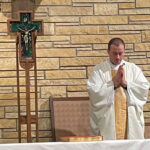
Patrick Collins cuts onion for a meatless dish served to retired priests and diocesan staff March 6 at St. Vincent Center in Davenport.
By Deacon Frank Agnoli
For The Catholic Messenger
(Editor’s note: This is the third in a Lenten series. Deacon Frank Agnoli, director of liturgy, answers some of the most frequently asked questions about Lent.)
What are the rules about fasting and abstinence? Why are Catholics supposed to “give up” something for Lent? Is it okay to “cheat” on Sundays? If someone is a vegetarian or vegan, how should they approach abstinence, since they don’t eat meat?
There are two aspects to “fasting” during Lent. First, there are the formal rules for fasting and abstinence on Ash Wednesday and the Fridays of Lent. This is the minimum that the Church asks of us:
Ash Wednesday and Good Friday are days of fast. On days of fast, one full meal and two lesser meals are allowed. Eating between meals is not permitted. Catholics between the ages of 18 and 59 are bound to fast.
Ash Wednesday and all of the Fridays of Lent are also days of abstinence. On days of abstinence, meat may not be taken. The law of abstinence binds all Catholics 14 years of age or older.
If members of the faithful are unable to observe the fast and abstinence regulations because of ill health or other reasons, they are urged to practice other forms of penance and self-denial suitable to their condition. Ignoring the laws of fast and abstinence is a serious matter.
While we’re to abstain (#2 above) from meat from animals that live on land (chickens, cows, sheep or pigs) or from birds, meat juices and liquid foods made from meat (such as chicken broth, consomme, soups cooked or flavored with meat, meat gravies or sauces, as well as seasonings or condiments made from animal fat) as well as gelatin, butter, cheese and eggs, are technically allowed. Salt and freshwater species of fish, amphibians, reptiles, (cold-blooded animals) and shellfish are permitted. At the same time, as the U.S. bishops put it, “indulging in the lavish buffet at your favorite seafood place sort of misses the point.”
There are no “rules” regarding how vegans or vegetarians are to observe days of abstinence. They are already observing the law (they are avoiding meat). So, they may want to consider their own way of keeping Lenten Fridays (simplifying meals, avoiding a particular dish, etc.); see #3 above.
Lent also calls us to fasting more broadly. Traditionally, fasting has referred to the partial or total avoidance of food or drink, practiced for a variety of spiritual reasons.
Fasting isn’t about punishment, or deprivation (“giving something up”) simply for its own sake, or, worse, thinking we earn God’s love or favor by doing so. Rather, it is a positive discipline that helps us grow in holiness; a response in love to being loved first by God. When we fast, we do so in solidarity with the hungry and with the Elect on their way to the Easter Sacraments. We also do so to become more aware that all that we have are gifts from God, and so foster a sense of gratitude and trust. In other words, Lent is about more than “giving up” – it’s about “growing up” in the spiritual life, together (something that takes a lifetime).
In today’s Roman Catholic Church, such fasting isn’t as regulated or severe as it has been in the past. But that doesn’t mean that we’re excused from the practice. Instead, we are called—as adult Christians—to determine what sort of fasting we are being called to undertake. For example, fasting from social media or other time online may be more helpful spiritually than fasting from food. More importantly, the Church asks that we not view fasting in isolation, but practice it together with other spiritual disciplines, such as frequent attendance at Eucharist, time spent in prayer and devotions, and works of charity. It’s all about living and growing in the Christian life.
You’re not “cheating” on Sundays. As the weekly Easter, a day of resurrection joy, Sundays are never fast days.
Why can’t we sing (or say) the Alleluia or Gloria at Mass during Lent?
Each season has its own “feel” to it – from the triumphant celebration of Easter to the expectant joy of Advent. Lent, too, has a particular “feel” to it. As a time of preparation, we’re waiting for the full jubilation of Easter. As a time of penance, we’re asked to keep a more subdued atmosphere. Thus, we don’t decorate the church with flowers. Musically, we don’t use instrumental music; instruments only accompany the human voice. And we refrain from singing both the Gloria, the joyous hymn of the angels, and the Alleluia, the Easter acclamation of the resurrection.











